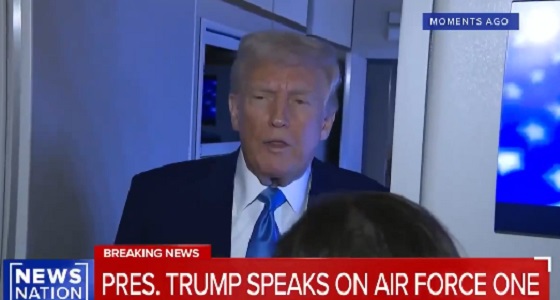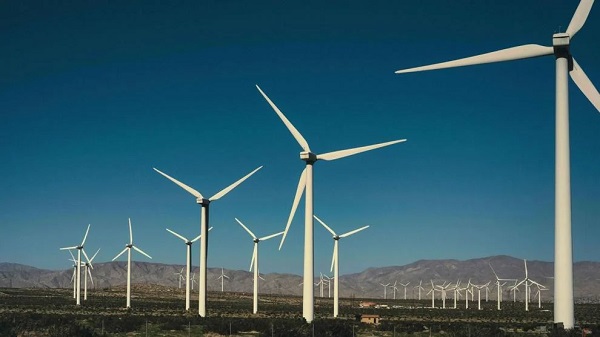Business
Trump says tariffs on China will remain until trade imbalance is corrected

 MxM News
MxM News
Quick Hit:
President Trump said Sunday he won’t make a tariff deal with China unless its $1 trillion trade surplus with the U.S. is balanced. Speaking aboard Air Force One, he called the deficit “not sustainable” and said tariffs are already driving a wave of investment back to America.
Key Details:
-
Trump told reporters the U.S. has “a $1 trillion trade deficit with China,” adding, “hundreds of billions of dollars a year we lose to China, and unless we solve that problem, I’m not going to make a deal.” He insisted any agreement must begin with fixing that imbalance.
-
The president said tariffs are generating “levels that we’ve never seen before” of private investment, claiming $7 trillion has already been committed in areas like auto manufacturing and chip production, with companies returning to places like North Carolina, Detroit, and Illinois.
-
On Truth Social Sunday night, Trump wrote: “The only way this problem can be cured is with TARIFFS… a beautiful thing to behold.” He accused President Biden of allowing trade surpluses to grow and pledged, “We are going to reverse it, and reverse it QUICKLY.”
Diving Deeper:
President Donald Trump reaffirmed his tough trade stance on Sunday, telling reporters that he won’t negotiate any new deal with China unless the massive trade deficit is addressed. “We have a $1 trillion trade deficit with China. Hundreds of billions of dollars a year we lose to China, and unless we solve that problem, I’m not going to make a deal,” Trump said while aboard Air Force One.
He emphasized that while some countries have deficits in the billions, China’s trade advantage over the U.S. exceeds a trillion dollars and remains the most severe. “We have a tremendous deficit problem with China… I want that solved,” he said. “A deficit is a loss. We’re going to have surpluses, or we’re, at worst, going to be breaking even.”
Trump touted the impact of tariffs already in place, pointing to an estimated $7 trillion in committed investments flowing into the U.S. economy. He highlighted growth in the automotive and semiconductor sectors in particular, and said companies are now bringing operations back to American soil—citing North Carolina, Detroit, and Illinois as examples.
He also claimed world leaders in Europe and Asia are eager to strike deals with the U.S., but he’s holding firm. “They’re dying to make a deal,” he said, “but as long as there are deficits, I’m not going to do that.”
Trump projected that tariffs would add another $1 trillion to federal revenues by next year and help re-establish the U.S. as the world’s top economic power. “Our country has gotten a lot stronger,” Trump said. “Eventually it’ll be a country like no other… the most dominant country, economically, in the world, which is what it should be.”
Later Sunday night, Trump doubled down in a Truth Social post, writing, “We have massive Financial Deficits with China, the European Union, and many others. The only way this problem can be cured is with TARIFFS, which are now bringing Tens of Billions of Dollars into the U.S.A.” He added that trade surpluses have grown under Joe Biden and vowed to reverse them “QUICKLY.”
Business
The richest man alive just got a whole lot richer

Quick Hit:
Elon Musk on Wednesday became the first person in history to hit a $500 billion net worth, according to Forbes. The Tesla, SpaceX, and xAI founder’s fortune now sits roughly $150 billion ahead of Oracle co-founder Larry Ellison, with Tesla’s surging stock and SpaceX’s record valuation driving the leap.
Key Details:
- Forbes reported Musk’s net worth crossed the $500 billion mark around 3:30 p.m. ET, fueled by Tesla’s nearly 4% stock gain Wednesday — adding roughly $9.3 billion to his wealth.
- Musk’s fortune has grown from $24.6 billion in March 2020 to $100 billion by late 2020, $200 billion in 2021, $400 billion in 2024, and now $500 billion.
- Tesla shares have nearly doubled since April, when Musk said he would step back from his role leading President Trump’s Department of Government Efficiency (DOGE) to focus on Tesla. The EV maker’s market cap is now within 10% of its all-time high, with Musk’s 12% stake worth about $191 billion.
Elon Musk achieved yet another major milestone Wednesday, becoming the first ever person worth $500 billion. Musk, who became the first person ever worth $400 billion or more in December, is $150 billion ahead of runner-up Larry Ellison—and half-way to becoming the world’s first… pic.twitter.com/h9LJmAvT7F
— Forbes (@Forbes) October 1, 2025
Diving Deeper:
Elon Musk made history Wednesday as the first individual ever to surpass a $500 billion personal net worth, according to a report from Forbes. The Tesla and SpaceX CEO’s fortune crossed the milestone in mid-afternoon trading, following another surge in Tesla’s share price and continuing investor confidence in Musk’s technology empire.
Tesla stock jumped nearly 4% Wednesday, pushing the company’s valuation closer to its all-time high. Forbes estimates Musk’s 12% stake in Tesla alone is worth about $191 billion. The remainder of his wealth comes from SpaceX — currently valued at around $400 billion — and his artificial intelligence firm xAI, worth roughly $60 billion.
Musk’s rise in wealth has been staggering. In March 2020, he was worth $24.6 billion. By late 2020, he had crossed the $100 billion threshold, reaching $200 billion in 2021 and $400 billion last year. His $500 billion milestone now puts him more than $150 billion ahead of the world’s second-richest person, Oracle co-founder Larry Ellison.
In a post on X last month, Musk said his compensation and influence over Tesla were not about money, but control over the company’s direction: “It’s not about ‘compensation,’ but about me having enough influence over Tesla to ensure safety if we build millions of robots,” he wrote. “If I can just get kicked out in the future by activist shareholder advisory firms who don’t even own Tesla shares themselves, I’m not comfortable with that future.”
According to Forbes, Tesla’s board recently proposed a new compensation plan for Musk worth as much as $1 trillion — the largest package ever offered to a corporate executive. The plan would grant Musk up to 12% of Tesla’s stock if the company hits a $8.5 trillion market cap and other performance milestones over a decade.
At his current trajectory, analysts suggest Musk could become the world’s first trillionaire by 2033 — an outcome that seemed unthinkable just five years ago. As Musk continues to balance his leadership at Tesla, SpaceX, and xAI, his financial empire appears to be expanding as rapidly as the industries he dominates.
Automotive
America’s Troubled EV Industry Loses Its Subsidized Advantage – Now What?


From the Daily Caller News Foundation
The Environmental Protection Agency announced Monday that it has assumed responsibility for what it says is the “Largest Lithium-Ion Battery Cleanup in Agency History” at the Moss Landing facility outside San Francisco.
Crews supervised by the EPA entered the facility this week to begin cleaning out the remains of the fire damaged batteries, which the agency says will be recycled at EPA-approved recycling facilities.
As has happened far too frequently, the retired batteries erupted spontaneously in January, leading authors of MIT’s weekly climate newsletter to speculate about what this latest conflagration would mean for the future of the electric vehicle and stationary battery storage industries going forward.
Dear Readers:
As a nonprofit, we are dependent on the generosity of our readers.
Please consider making a small donation of any amount here.
Thank you!
“With the growing number of electric vehicles and batteries for energy storage on the grid,” the authors wrote, “more high-profile fires have hit the news, like last year’s truck fire in LA, the spate of e-bike battery fires in New York City, or one at a French recycling plant last year.”
The parade of troubling incidents related to these batteries has continued throughout 2025. In June, for example, a large container ship called the Morning Midas, operated by Zodiac Maritime, sank into the Pacific Ocean after batteries in EVs it was carrying to Alaska spontaneously combusted, forcing the crew to abandon ship. A month later, U.S.-based shipper Matson announced it would no longer transport EV cargoes due to the obvious dangers involved. Three weeks later, Alaska Marine Lines put a similar policy in place.
All of these inconvenient news stories come at an already troubling time for the U.S. EV industry, given that its huge $7,500 per car federal subsidy expired at midnight, Sept. 30. That subsidy was enacted in the Orwellian-named Inflation Reduction Act of 2022 and subsequently repealed in the One Big Beautiful Bill Act signed into law by President Donald Trump on July 4 of this year.
Sales have spiked in the run-up to the subsidy expiration, to no one’s real surprise. But EV makers now face the troubling prospect of having to compete in the U.S. market absent that significant price advantage, leading many to anticipate a significant drop-off in sales.
Some carmakers have already begun to scale back operations. Stellantis announced the cancellation of a planned all-electric Dodge Ram pickup model on Sept.12, citing slowing demand for such trucks in a field already dominated by the Ford F-150 Lightning and the Tesla Cyber Truck. The fact that sales of those competing models are already coming in well below projections this year was another obvious motivating factor.
Ford, meanwhile, said in August it would delay the introduction of what it refers to as “next generation” updates to its Lightning pickup and full-sized electric van for two years due to the same challenging market conditions. “F-150 Lightning, America’s best-selling electric truck, and E-Transit continue to meet today’s customer needs,” the company said in what can only be described as an understatement.
Competitor GM announced it would take similar action on Sept. 4, saying it was suspending production of a pair of Cadillac SUVs – the mid-size Lyriq and the full-size Vistiq – at its assembly plant in Spring Hill, Tenn., effective in December. The company also said it would indefinitely delay the start of a second shift at an assembly plant near Kansas City.
Amid the frequent big fire events involving EV batteries and the industry’s fallout from the loss of a federal subsidy, it must be repeated here that the electric vehicle industry is not “new” or even a young one. It is in fact well over a century old, with the first electric cars introduced in the U.S. in the 1890s, during the same period when gas-powered cars started to come onto the market. In those early years, in fact, many experts insisted that electric cars would ultimately render gas-powered cars obsolete and become the dominant force in American transportation.
But makers of EVs then found themselves suffering from the same set of limitations that plague the industry well over a century later: Range anxiety, lack of infrastructure, and persistent unreliability.
The fact that an industry this old has still not solved for the same set of issues after so much time makes it reasonable to question whether it ever will.
David Blackmon is an energy writer and consultant based in Texas. He spent 40 years in the oil and gas business, where he specialized in public policy and communications.
-

 National1 day ago
National1 day agoCanada’s birth rate plummets to an all-time low
-

 Alberta13 hours ago
Alberta13 hours agoWith no company willing to spearhead a new pipeline under federal restrictions, Alberta takes the lead
-

 Fraser Institute2 days ago
Fraser Institute2 days agoAboriginal rights now more constitutionally powerful than any Charter right
-

 Alberta2 days ago
Alberta2 days ago$150 a week from the Province to help families with students 12 and under if teachers go on strike next week
-

 espionage1 day ago
espionage1 day agoNorth Americans are becoming numb to surveillance.
-

 Crime1 day ago
Crime1 day agoPierre Poilievre says Christians may be ‘number one’ target of hate violence in Canada
-

 Alberta14 hours ago
Alberta14 hours agoTaxpayers: Alberta must scrap its industrial carbon tax
-

 Alberta13 hours ago
Alberta13 hours agoHalfway River First Nation makes history with Montney natural gas development deal



